 W
WBernard Sanders is an American politician and activist who has served as the junior United States senator from Vermont since 2007 and as U.S. Representative for the state's at-large congressional district from 1991 to 2007. He is the longest-serving independent in U.S. congressional history, although he has a close relationship with the Democratic Party, having caucused with House and Senate Democrats for most of his congressional career. Sanders unsuccessfully sought the Democratic Party nomination for president of the United States in 2016 and 2020, finishing in second place in both campaigns. Before his election to Congress, he was mayor of Burlington, Vermont.
 W
WThe 1972 United States Senate special election in Vermont took place on January 7, 1972. Incumbent Republican Robert Stafford, appointed in September 1971 to fill the vacancy created by the death of Winston L. Prouty, successfully ran for election to the remainder of Prouty's term in the United States Senate. Stafford defeated Democratic candidate Randolph T. Major. Liberty Union candidate Bernie Sanders received 2% of the vote and was later elected to this seat in 2006 as an independent.
 W
WThe 1972 Vermont gubernatorial election took place on November 7, 1972. The incumbent Republican Gov. Deane C. Davis was not a candidate for re-election to another term as Governor of Vermont. The Democratic nominee, Thomas P. Salmon, defeated the Republican nominee, Luther F. Hackett, to become his successor. Future U.S. senator and presidential candidate Bernie Sanders ran as a member of the Liberty Union Party.
 W
WThe 1974 United States Senate election in Vermont took place on November 5, 1974. The incumbent Republican Senator, George Aiken, did not run for re-election to another term in the United States Senate. The Democratic nominee, attorney and prosecutor Patrick Leahy, defeated Republican nominee, then-Rep. Richard W. Mallary, to become Aiken's successor.
 W
WThe 1976 Vermont gubernatorial election took place on November 2, 1976. Incumbent Democrat Thomas P. Salmon did not seek another term as Governor of Vermont, instead running for United States Senate. Republican candidate Richard A. Snelling defeated Democratic candidate Stella B. Hackel and Liberty Union candidate Bernie Sanders to succeed him.
 W
WThe 1981 Burlington mayoral election was held March 3, 1981. Bernie Sanders, who ran as an independent candidate, defeated incumbent Democratic Mayor Gordon Paquette, who was seeking an sixth term as Mayor of Burlington, Vermont, and Richard Bove.
 W
WThe 1983 Burlington mayoral election was held March 1, 1983. Incumbent Mayor Bernie Sanders won with 52.12% of the popular vote against Democratic nominee Judith Stephany and Republican nominee James Gilson.
 W
WThe 1985 Burlington mayoral election was held March 5, 1985. Incumbent Mayor Bernie Sanders won with 56.09% of the popular vote against Democratic nominee Brian D. Burns, independent Diane Gallagher, and various other minor candidates.
 W
WThe 1986 Vermont gubernatorial election took place on November 4, 1986. Incumbent Democrat Madeleine Kunin ran successfully for re-election to a second term as Governor of Vermont, defeating Republican candidate Peter Plympton Smith and independent candidate Bernie Sanders. Since no candidate won a majority of the popular vote, Kunin was elected by the Vermont General Assembly per the state constitution.
 W
WThe 1987 Burlington mayoral election was held on March 3, 1987. Incumbent Mayor Bernie Sanders won election to his fourth and final term as mayor with 55.23% of the popular vote against Democratic nominee Paul Lafayette, a member of the city council.
 W
WThe 1988 United States House of Representatives election in Vermont was held on November 8, 1988. Republican nominee Peter Plympton Smith defeated independent candidate Bernie Sanders and Democratic nominee Paul N. Poirier.
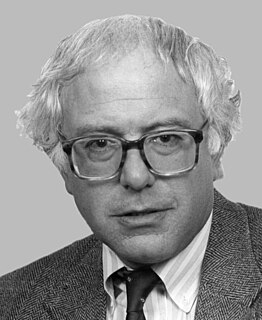 W
WThe 1990 United States House of Representatives election in Vermont was held on Tuesday, November 6, 1990 to elect the U.S. Representative from the state's at-large congressional district. The election coincided with the elections of other federal and state offices.
 W
WThe 1992 United States House of Representatives election in Vermont was held on Tuesday, November 3, 1992 to elect the U.S. Representative from the state's at-large congressional district. The election coincided with the elections of other federal and state offices, including a quadrennial presidential election and an election to the U.S. Senate.
 W
WThe 1994 United States House of Representatives election in Vermont was held on Tuesday, November 8, 1994 to elect the U.S. Representative from the state's at-large congressional district. The election coincided with the elections of other federal and state offices, including an election to the U.S. Senate.
 W
WThe 1996 United States House of Representatives election in Vermont was held on Tuesday, November 5, 1996 to elect the U.S. Representative from the state's at-large congressional district. The election coincided with the elections of other federal and state offices, including a quadrennial presidential election.
 W
WThe 1998 United States House of Representatives election in Vermont was held on Tuesday, November 3, 1998 to elect the U.S. Representative from the state's at-large congressional district. The election coincided with the elections of other federal and state offices, including an election to the U.S. Senate.
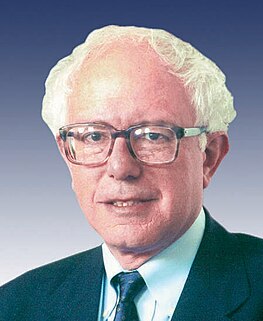 W
WThe 2000 United States House of Representatives election in Vermont was held on Tuesday, November 7, 2000 to elect the U.S. Representative from the state's at-large congressional district. The election coincided with the elections of other federal and state offices, including a quadrennial presidential election and an election to the U.S. Senate.
 W
WThe 2002 United States House of Representatives election in Vermont was held on Tuesday, November 5, 2002 to elect the U.S. Representative from the state's at-large congressional district. The election coincided with the elections of other federal and state offices.
 W
WThe 2004 United States House of Representatives election in Vermont was held on Tuesday, November 2, 2004, to elect the U.S. Representative from the state's at-large congressional district. The election coincided with the elections of other federal and state offices, including a quadrennial presidential election and an election to the U.S. Senate.
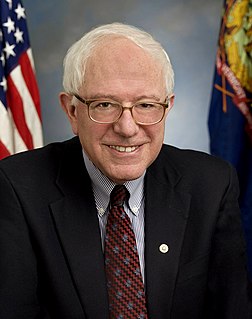 W
WThe 2006 United States Senate election in Vermont was held November 7, 2006. Incumbent independent Senator Jim Jeffords decided to retire rather than seek reelection to a fourth term in office and Bernie Sanders was elected to succeed him.
 W
WThe 2012 United States Senate election in Vermont was held on November 6, 2012, alongside the presidential election, other elections to the United States Congress, as well as various state and local elections. Incumbent Independent U.S. Senator Bernie Sanders won re-election to a second term in a landslide, capturing nearly three-quarters of the vote.
 W
WThe 2018 United States Senate election in Vermont was held November 6, 2018, alongside a gubernatorial election, U.S. House election, and other state and local elections. Incumbent independent Senator Bernie Sanders was re-elected to a third term. The primaries were held on August 14.
 W
WIn January 2021, a photograph of Bernie Sanders, a U.S. senator from Vermont and former presidential candidate, seated during the inauguration of Joe Biden and wearing a face mask and distinctive mittens, went viral. The photograph became an internet meme, inspiring altered versions in which Sanders was placed in historical photographs and other humorous contexts. The popularity of the meme resulted in increased visibility for Sanders and demand for the mittens.
 W
WThis article lists potential candidates for the Democratic nomination for Vice President of the United States in the 2016 election. Former Secretary of State Hillary Clinton, the 2016 Democratic nominee for President of the United States, chose Senator Tim Kaine of Virginia as her running mate. The formal nomination took place at the 2016 Democratic National Convention. The Clinton-Kaine ticket lost the 2016 presidential election to the Republican Trump-Pence ticket, and Kaine returned to the Senate following the campaign.
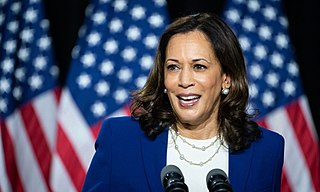 W
WThis article lists potential candidates for the Democratic nomination for Vice President of the United States in the 2020 presidential election. Former Vice President Joe Biden of Delaware, the 2020 Democratic nominee for President of the United States, considered several prominent Democrats and other individuals before selecting Senator Kamala Harris of California as his running mate on August 11, 2020. Harris formally won the vice presidential nomination on August 19, 2020, at the 2020 Democratic National Convention. The Biden–Harris ticket won the 2020 election, defeating the Republican (Trump–Pence) ticket.
 W
WThe electoral history of Bernie Sanders includes the 2016 Democratic Party presidential primaries and caucuses, and elections as United States Senator from Vermont, United States Representative from Vermont's at-large district (1991–2007), and Mayor of Burlington (1981–1989). Sanders contested 23 elections, of which he won 17. He has won every election he has contested since his first election to the House of Representatives in 1990, except his presidential runs.
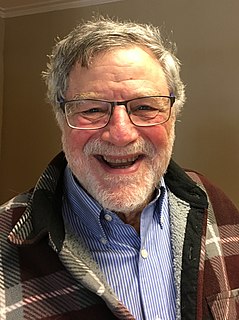 W
WStanley "Huck" Gutman is an American academic and political advisor. He is a professor of English at the University of Vermont and former chief of staff to presidential candidate Bernie Sanders. He is the co-author of Sanders's political memoir, Outsider in the White House.
 W
WThe mayoralty of Bernie Sanders lasted from April 6, 1981, to April 4, 1989, while he served as the 37th Mayor of Burlington, Vermont. Sanders' administration was the first socialist one in New England since the mayoralty of Jasper McLevy. He was regarded as a successful mayor that instituted multiple economic policies in Burlington, and was selected as one of the twenty best mayors in the United States by U.S. News & World Report in 1987. He was active in foreign affairs, primarily in Latin America in which he criticized the policy of the United States and visited Cuba, Nicaragua, and the Soviet Union, and was criticized for it by his opponents.
 W
WThe media coverage of Bernie Sanders, a US Senator from Vermont, became a subject of discussion during his unsuccessful 2016 and 2020 presidential runs. His campaigns, some independent observers, and some media sources have said that the mainstream media in the United States is biased against Bernie Sanders. Others say that coverage is unbiased or biased in his favor. The allegations of bias primarily concern the coverage of his presidential campaigns.
 W
WOur Revolution is an American progressive political action organization spun out of Senator Bernie Sanders's 2016 presidential campaign to continue its work. The organization's mission is to educate voters about issues, get people involved in the political process, and work to organize and elect progressive candidates. Our Revolution is also the title of a book by Sanders released in November 2016.
 W
WThe political positions of Bernie Sanders are reflected by his United States Senate voting record, public speeches, and interviews. He is a self-described democratic socialist. Bernie Sanders is an independent senator from Vermont who has served in government since 1981.
 W
WMary Jane O'Meara Sanders is an American social worker, college administrator, activist and political strategist. Sanders was provost and interim president of Goddard College (1996–1997) and president of Burlington College (2004–2011). In June 2017, she founded the think tank The Sanders Institute. She has been married to U.S. Senator Bernie Sanders since 1988.
 W
WLawrence Sanders is an American-British academic, social worker, politician, and Health Spokesperson of the Green Party of England and Wales. He is the older brother of Bernie Sanders, United States Senator and two-time U.S. presidential candidate.
 W
WThe Tax Relief, Unemployment Insurance Reauthorization, and Job Creation Act of 2010, also known as the 2010 Tax Relief Act, was passed by the United States Congress on December 16, 2010, and signed into law by President Barack Obama on December 17, 2010.
 W
WIn the United States, Sanders–Trump voters, also known as Bernie–Trump voters, are Americans who voted for Bernie Sanders in the 2016 or 2020 Democratic Party presidential primaries, but who subsequently voted for Republican Party nominee Donald Trump in the general election. In the 2016 election, these voters comprised an estimated 12% of Sanders supporters. In contrast, more than 70% of Sanders supporters voted for Democratic Party nominee Hillary Clinton.
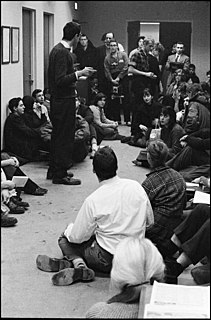 W
WThe University of Chicago sit-ins were a series of nonviolent protests at the University of Chicago in Chicago, Illinois in 1962. The protests were called to end alleged segregation in off-campus university owned residential properties.